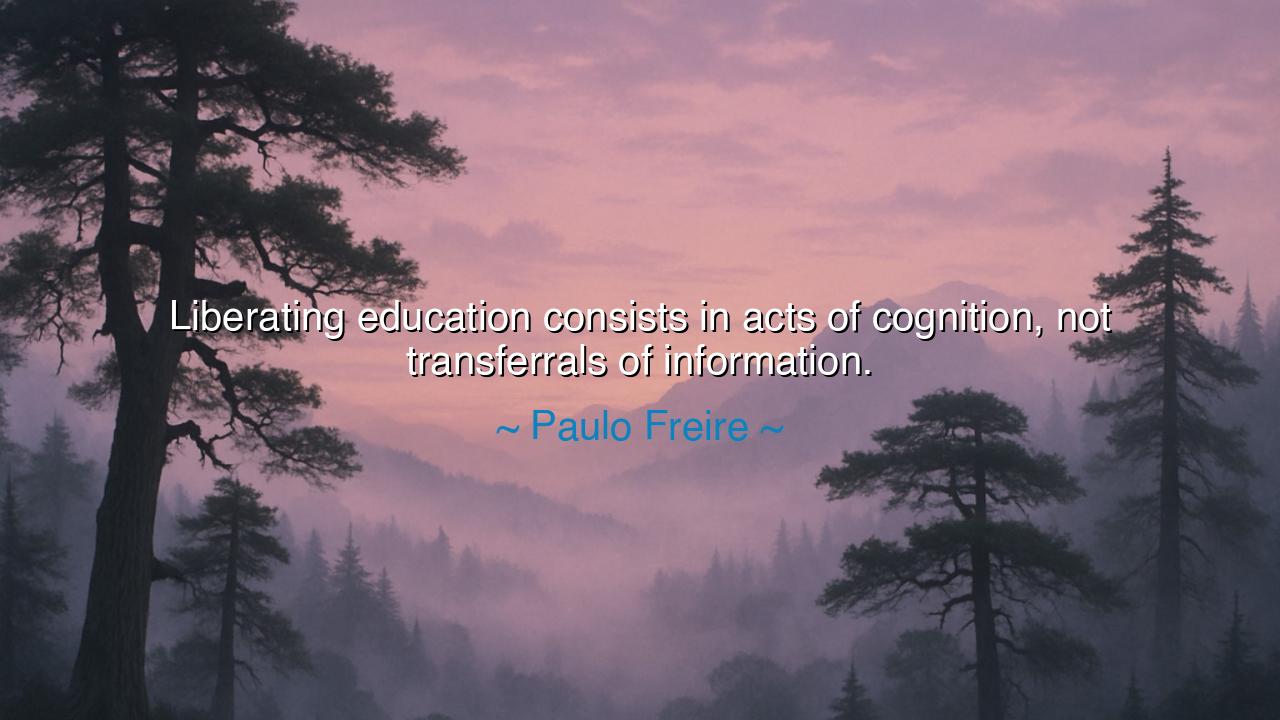
Liberating education consists in acts of cognition, not






Hear now the voice of Paulo Freire, teacher of the poor, prophet of the oppressed, who proclaimed: “Liberating education consists in acts of cognition, not transferrals of information.” These words are a flame to those who would see education not as a chain, but as a key. Freire, who walked among the laborers and the dispossessed of Brazil, saw that true learning is not the passive filling of empty vessels, but the awakening of the mind to question, to reflect, to know itself.
For what are mere transferrals of information? They are the reciting of facts, the depositing of knowledge into the student’s memory, as one might store grain in a barn. Such education does not free; it enslaves. It teaches obedience, not wisdom. It makes students dependent upon authority, unable to think for themselves, repeating what they are told without ever asking why. This, Freire named the “banking model” of education—where teachers deposit, and students receive, without life, without transformation.
But acts of cognition—these are sparks of liberation. When a student is invited to think, to question, to wrestle with the meaning of the world, something holy happens. The mind ceases to be a container and becomes a forge. Each question becomes a hammer-blow, shaping understanding; each discovery becomes a flame, burning away ignorance. Such an education awakens dignity, for it reminds the learner that he is not a machine but a human being, capable of reason, judgment, and creation.
Freire’s own story illustrates this truth. Among the poor farmers of Brazil, he taught not by dictating but by dialogue. He began with the words of their daily lives—“work,” “bread,” “land”—and from these humble syllables, he invited them to reflect on injustice, on power, on their own humanity. Through cognition, they realized that their poverty was not natural, but imposed; not destiny, but oppression. With this awakening, they gained courage to resist, to organize, to demand change. Thus, liberating education did not merely fill their minds—it set their spirits free.
History too bears witness. Socrates, long before Freire, walked the streets of Athens asking questions, not dictating truths. He sought not to transfer information, but to awaken thought in his companions. And though the city condemned him, his legacy endures, because his method was liberating: it taught men to think for themselves, to seek wisdom within, and not to rely on the decrees of others. This is the ancient root of Freire’s modern cry.
The wisdom of the quote is this: if education is to serve freedom, it must be more than instruction—it must be transformation. Information may train a worker, but cognition shapes a citizen. Information may prepare one to obey, but cognition prepares one to question and to lead. A society that desires submission will choose the former; a society that desires freedom must choose the latter.
Therefore, O listener, take this lesson into your own heart. Do not be content merely to receive knowledge; strive always to engage it, to test it, to make it your own. When you read, do not only memorize—reflect. When you hear, do not only listen—question. When you teach, do not only transfer—invite dialogue. In this way, you will not only be informed, but liberated.
For as Paulo Freire declared, liberating education is found not in the lifeless deposit of facts, but in the living act of cognition. Choose this path, and you will walk not as a vessel filled by others, but as a soul awakened to truth, capable of shaping the world with the fire of your own understanding.






AAdministratorAdministrator
Welcome, honored guests. Please leave a comment, we will respond soon